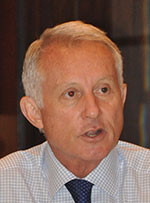
Datuk Richard Curtis
KUCHING: Cahya Mata Sarawak Bhd (CMS) is currently working on brownfield expansion by implementing the jobs that the group has in hand.
Its group managing director Datuk Richard Curtis noted that CMS is busy implementing some of the work which include increasing to meet the increasing demand for its products.
“At present, we are (focusing on) implementing what we have got. We are doing some brownfield (expansion) work.
“We are optimistic that our operations will be operating efficiently,” he told reporters after the company’s 41th Annual General Meeting (AGM) yesterday.
According to the company’s Annual Report 2015, the group plans to further increase the production capacity of quality crushed aggregates by installing a second production line at Sibanyis which will have a crushing plant capacity of 1.3 million metric tonne (MT) per annum.
The company said in June 2015, the production capacity at Sibanyis was increased from 600,000MT to 900,000MT per annum.
CMS explained that the increased capacity will enable its subsidiary, CMS Quarries Sdn Bhd to continue providing a steady supply of quality crushed aggregates at competitive prices to meet the growing market demand throughout Sarawak.
In the meantime, CMS noted the group’s quarrying operations encompass five quarries that have a combined annual rated capacity of 3.45 million MT per annum.
Besides, the company is conducting a feasibility studies to set up a concrete precast products manufacturing plant in Bintulu which could cost approximately RM4 million while it has commenced ready-mix concrete operations in Samalaju.
Additionally, CMS said to meet the anticipated increase in cement demand, its cement division has developed a new 1 million MT per annum grinding plant adjacent to the Mambong clinker plant.
The group observed that the new RM190 million plant has begun commercial cement production in December 2015 and will be fully operational by the first half of 2016.
CMS believed with the third grinding plant, its cement division’s total production capacity will increase by almost 60 per cent with an annual combined rated production capacity of 2.75 million MT per annum.
Curtis revealed that the group is cautiously looking at the exports of cements particularly to Kalimantan, Indonesia and other neighbouring countries depending on the level of demand in those places and how competitively CMS group can supply.
“We are looking at a steady modest stream of exports going into the border areas of Kalimantan and even other neighbouring countries depending on demand,” he said.
When queried on the demand for the Pan Borneo Highway Sarawak project, Curtis foresees that the project will utilise a substantial fair amount of cement but which would be spreaded over many years.
He explained that the cement will be used in building precast bridges culverts and the like along the highway.
Asked further on the company’s tender for a package for the Pan Borneo Highway Sarawak, he acknowledged that the group has submitted a tender and will be submitting further tenders.
At present, he noted CMS is still awaiting for the contract award.
“We hope to be able to successfully secure a package due to our proven track record of road building in the state and our in house raw materials supply capability covering stones aggregates, premix, precast and ready mix,” Curtis responded without giving a timeline for any contract award.
On another note, he said the construction of an Integrated Phosphate Complex in Samalaju is expected to commence in the third quarter of this year once all the necessary procedures are finalised.
Curtis observed that the complex, the first non-metal or alloy-based plant at Samalaju Industrial Park (SIP) is scheduled to be operational in phases beginning financial year 2018 (FY18).
“The plant offers opportunities for investment in downstream manufacturing in the animal feed, fertiliser, cleaning and detergent sectors.
“It is envisaged that businesses in these sectors will be drawn to SIP themselves so they can locate themselves adjacent to their feedstock supplier.
“The project is set to propel Malaysia forward as a leader in the production of halal-certified animal feed for poultry, fisheries, cattle and other ruminant livestock as it eliminates the use of meat and bone meal in all animal feed.
“As the first large scale producer of soluble phosphates in Malaysia. the project will also contribute significantly towards the government’s effort to increase food security and the palm oil industry’s competitiveness,” he believed.
